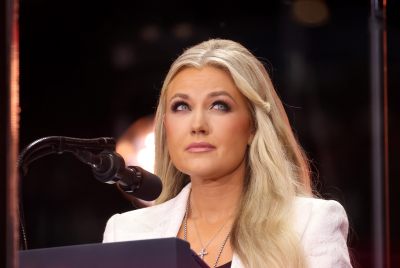Workers Say Walmart And Target Are 'Deceiving Customers' By Removing Price Tags So They Can Jack Up Prices

KEY POINTS
- Walmart admits labelling changes, blames cost pressures.
- Target silent as price match policy also scrapped.
- 'Not a win-win': Shoppers call for transparency amid sticker shock.
Retail giants Walmart and Target are under fire from workers and shoppers alike, as reports mount that the companies are quietly removing price tags from items — allegedly to allow for unannounced price hikes tied to looming tariffs.
The backlash, sparked by viral videos on platforms like TikTok, has intensified in recent days. Footage shows employees in uniform systematically tearing off price tags from products such as children's clothing, underwear and household items. One Target employee, Mykala Montalbano, shared a now-viral clip of herself spending nearly an entire shift removing tags, captioned: 'Spent almost a whole 8-hour shift just doing this.' Another user, Amanda, uploaded a similar video, with one exhausted commenter simply writing: 'im soooo over it.'
@mykalamontalbano spent almost a whole 8 hour shift just doing this #democrat #tarrifs #work #target #fyp #foryou
♬ Vogue (Edit) - Madonna
In some instances, commenters took a harsher tone. 'WALMART IS Deceiving PEOPLE. ALSO MAKING WORKERS DO THEIR DISHONEST WORK...' wrote one outraged viewer. Others highlighted the potential consequences for everyday consumers, with one noting: 'Leave the prices on so America can see what they would've been without these tariffs.'
The trend, reportedly part of a broader retail strategy to quietly reprice items ahead of expected tariff-related cost surges, has drawn widespread criticism. Observers point to examples like identical children's outfits at Walmart priced differently — some with original tags intact, others relabelled or bearing no price at all. This inconsistency, consumers argue, is a clear indication of deceptive tactics.
Corporate Defence and Consumer Distrust
In a statement to The U.S. Sun, Walmart explained the shift as part of an evolving labelling strategy: 'As we strive to provide the best value for our customers while remaining flexible and competitive, earlier this year we implemented a change to our labelling process for some items.'
The company added that prices are now often displayed on shelves or pegs instead of on individual hang tags, with some products also receiving new stickers. While Walmart has not directly linked this move to tariffs, CEO Doug McMillon acknowledged during a recent earnings call that 'price increases are on the horizon.'
'As we replenish inventory at post-tariff price levels, we've continued to see our costs increase each week', McMillon said.
Target, on the other hand, has remained silent amid the growing uproar. Yet evidence of similar practices has emerged from its stores, with employees and customers alike sharing their observations online. Critics argue that Target's recent decision to scrap its decade-old price-matching policy with Walmart and Amazon is compounding public frustration.
A Target spokesperson claimed the company remains committed to offering value: 'Target's Price Match Guarantee, paired with our commitment to being priced right daily, ensures guests get great prices when shopping Target.'
Still, many shoppers remain unconvinced.
'Not a Win-Win for Anyone'
The controversy has sparked a broader discussion around transparency, corporate ethics, and the impact of inflation on consumers already struggling with cost-of-living pressures.
One user on social media called for more conscious consumerism: 'Shop small and local. Even if you're trapped in some rural hellscape (like I am right now, temporarily), there are local grocers and farmers markets.'
Another added: 'Walmart is blaming tariffs, but in actuality, it is their way of raising prices. And most of the prices now have been left untagged, so customers have no clue as to what the new price is. Not a win-win for the customer or for Walmart.'
The pricing debate underscores growing tension between corporate cost-cutting measures and the expectation for fair, visible pricing. With inflation continuing to squeeze household budgets, the removal of something as simple as a price tag is being interpreted as a form of manipulation.
Walmart and Target may be trying to stay ahead of economic headwinds, but their customers are watching closely. They want fair pricing, one that is visible and justifiable.
© Copyright IBTimes 2025. All rights reserved.





















